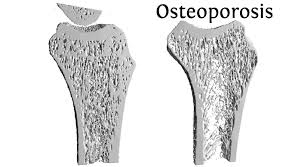Consuming Phytates Helps Strengthen Bones And Reduce Osteoporosis Risk

Osteoporosis is a disease where bones loose the material they are made of and become weakened. The outside of a bone is called cortical bone and is solid. The inside of a bone contains trabecular bone, which is not solid, and has a honey-comb type structure. The spaces of the honey-comb are filled with bone marrow fluid, which produces blood and some fat cells.
Osteoporosis causes bone mass loss and the spaces in the honey-comb become bigger. This results in less support for the bones, and bones become weaker and more prone to fracture.
Phytates And Osteoporosis
Phytates are a compound found in grains, nuts, seeds, and legumes. Earlier studies[1][2] done on dogs and rats concluded that phytates had a bone softening and anti-calcifying effect, which led people to avoid phytate consumption.
Recent human studies have shown that the consumption of phytates actually helped prevent bone loss and osteoporosis. This study[3] measured 157 postmenopausal women’s phytate levels over a 12 month period and women with the highest levels of phytate had the lowest levels of bone loss.
Other studies have shown that people who avoid the consumption of phytates have reduced bone mineral density compared to people who eat high phytate diets.[4][5]
It appears phytates’ osteoporosis fighting power comes from its ability to block the formation of bone eating cells and their bone eating activity.[6] The consumption of phytates have been shown to inhibit the dissolving of bone, similar to anti-osteoporosis drugs.
[1] E. Mellanby. The rickets-producing and anti-calcifying action of phytate. J. Physiol. 1949 109(3 – 4):488 – 533.
[2] W. A. House, R. M. Welch, D. R. Van Campen. Effect of phytic acid on the absorption, distribution, and endogenous excretion of zinc in rats. J. Nutr. 1982 112(5):941 – 953.
[3] A. A. López-González, F. Grases, N. Monroy, B. Marí, M. T. Vicente-Herrero, F. Tur, J. Perelló. Protective effect of myo-inositol hexaphosphate (phytate) on bone mass loss in postmenopausal women. Eur J Nutr 2013 52(2):717 – 726.
[4] A. A. López-González, F. Grases, P. Roca, B. Mari, M. T. Vicente-Herrero, A. Costa-Bauzá. Phytate (myo-inositol hexaphosphate) and risk factors for osteoporosis. J Med Food. 2008 11(4):747 – 752[3] A. A. Lopez-Gonzalez, F. Grases, J. Perello, F. Tur, A. Costa-Bauza, N. Monroy, B. Mari, T. Vicente-Herrero. Phytate levels and bone parameters: A retrospective pilot clinical trial. Front Biosci (Elite Ed) 2010 2:1093 – 1098.
[5] A. A. Lopez-Gonzalez, F. Grases, J. Perello, F. Tur, A. Costa-Bauza, N. Monroy, B. Mari, T. Vicente-Herrero. Phytate levels and bone parameters: A retrospective pilot clinical trial. Front Biosci (Elite Ed) 2010 2:1093 – 1098.
[6] M. del Mar Arriero, J. M. Ramis, J. Perelló, M. Monjo. Inositol hexakisphosphate inhibits osteoclastogenesis on RAW 264.7 Cells and human primary osteoclasts. PLoS ONE 2012 7(8):e43187.






